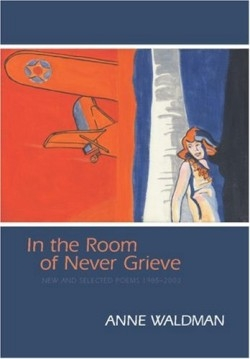In the Room of Never Grieve
New and Selected Poems 1985-2003
This poet picks up where Allen Ginsberg and H.D. left off, bridging the gap between the Beats of the ‘60s and the slam poets of today. Gathering more than twenty years’ worth of work, the collection chronicles a lifetime of writing that is both celebratory and politically aggressive. A CD accompanies the book, offering readers a chance to hear Waldman’s iconoclastic vocal stylings, as if the specific performance instructions that preface particular poems weren’t enough. This book resonates as a powerful enactment of Whitman’s “barbaric yawp.”
Waldman may be familiar to audiences because of her work in Bob Dylan’s experimental film Renaldo and Clara. She is the author of more than forty books of poetry and the co-founder, with Allen Ginsberg, of the Jack Kerouac School of Disembodied Poetics at the Naropa Institute in Colorado.
In these poems, Waldman plays with form, collecting her book-length narratives with meditations and panegyrics. Like H.D. before her, Waldman tries to fight against the patriarchy and in so doing, she creates her own gods-those of poetry and art-Jasper Johns, Ginsberg, Elizabeth Murray, Frank O’Hara, Larry Rivers, Sappho, the spirituality of Tibetan Buddhism, and the celebration of woman as descendent and transcendent goddess. Her understanding of the multiple traditions of the patriarchy, Eastern religions, Western literature, and popular culture informs her poetry. Her poems employ the cadences of conversation, letter writing, and litany, along with her visual images and the occasional front note that leads readers through a dream sequence or other such metaphorical journey.
Waldman’s respect for the tradition of her art speaks powerfully throughout the collection. There is always the sense that the poet perceives her work in the context from which it sprang-an oral tradition. Poems are meant to be screamed or sung, never read silently in a corner. Poetry, for this poet and activist, is a public practice, and the accompanying CD corroborates the assertions of the rhythms on the page. She sings out: “Desire, desire, desire, how it sounds in jubilation,” rages in “Spel Against Specious Ones”: “that if they perpetuate war & famine they rot in hell / that hell be ferociously hot,” and mocks in “Millenium Sutra”: “apocalyptic tongue’d preachers / line the mall / with glib glow & twitch / so that you sign on sign on.”
Perhaps Waldman herself best sums up her life’s work in “Verses for the New Amazing Grace”: “But poetry’s Goddess sent / To save a wretch like me / She strums the strings of life’s desperate edge / With her haunting melody.”
Reviewed by
Camille-Yvette Welsch
Disclosure: This article is not an endorsement, but a review. The publisher of this book provided free copies of the book to have their book reviewed by a professional reviewer. No fee was paid by the publisher for this review. Foreword Reviews only recommends books that we love. Foreword Magazine, Inc. is disclosing this in accordance with the Federal Trade Commission’s 16 CFR, Part 255.

